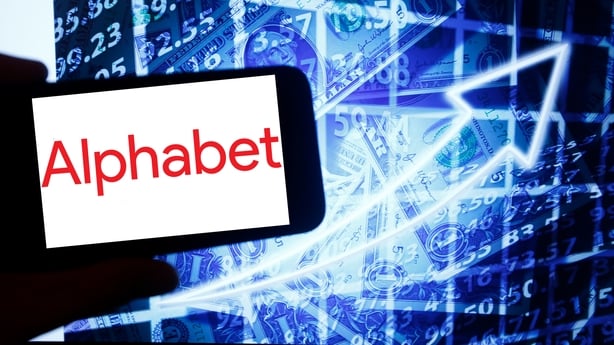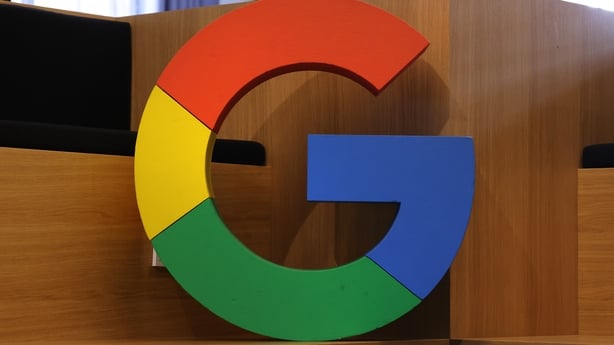Google-parent Alphabet inched closer to joining peers Apple and Microsoft in the elite $2 trillion market valuation club as the search giant's shares surged 10% today after another very strong quarter.
The gains, if they hold, could be the biggest single-day gain for the stock since 2015.
This would ease some of the concerns around Big Tech valuation that triggered a sector-wide selloff in the past few days.
"The technology sector started 2022 with some of the biggest question marks over it since the dotcom crash more than two decades ago," said Russ Mould, investment director at AJ Bell.
"However, the largest and highest quality US tech names continue to deliver the answers the market wants with big earnings beats," he added,
Alphabet's stock rose as much as 10.8% to $3,049.5 in trading before the opening bell. At least 20 brokerages raised their price targets on the stock, lifting the overall Wall Street median target to $3,450.
Alphabet also announced a 20-to-1 stock split, which will give shareholders 19 shares for every share they hold, bringing its price down to about $138 based on Tuesday's close.
Splitting stocks is a method companies use to woo investors by making them more affordable. However, some brokerages, such as Robinhood Markets, allow investors to buy fractions of shares, making the tactic less effective.
Tesla and Apple have also split stocks in recent months to make their shares more appealing to mom-and-pop investors.
Facebook-parent Meta Platforms, which is set to report results tonight, and Amazon.com also rose about 3% in premarket trading.
Adding to the rebound in tech stocks, Advanced Micro Devices shares jumped 12% after its results topped Wall Street expectations. Shares of rivals Nvidia, Qualcomm, Xilinx and Micron also rose.
Alphabet last night reported record quarterly sales that topped expectations, as its internet advertising business surged on consumers using Google search as they shopped online and advertisers upping their marketing budgets.

The results were the latest to reinforce that the global trend toward a more digital economy has made Big Tech companies resistant to small-market shocks.
Concerns about rising inflation, Covid-19 variants and supply-chain shortages have rattled Wall Street and hurt sales at some businesses.
But the companies that control key gateways to e-commerce, hybrid work and streaming entertainment have not seen a dip since the early days of the pandemic.
Alphabet's sales jumped 32% to $75.3 billion in the fourth quarter, for a third quarterly sales record in a row and topping the average estimate of $72 billion among analysts.
Consumers dove into Google search looking for clothing and hobbyist items, while retail, finance, entertainment and travel advertisers raised marketing budgets, chief business officer Philipp Schindler said.
Analysts said Google, which generates more revenue from internet ads than any other company, is proving that its growth is unstoppable for the foreseeable future.
Shares of Alphabet rose 8.6% in after-hours trading, to $2,990.10, erasing their losses for the year-to-date.
Shares of competitors in online ads including Facebook owner Meta Platforms, Twitter, Trade Desk and Snap all rose as well.
Under the planned 20-for-one stock split, investors as of July 1 will receive 19 additional shares for each one held.
The split, which is subject to shareholder approval, will make the stock more affordable and potentially eligible for inclusion in more market indexes.
Shares of Apple and Tesla rallied in 2020 after splits, but increasingly brokerages such as Robinhood Markets allow purchases of fractional shares, diminishing some benefit of the tactic.
For the 2021 full year, Alphabet said its sales rose 41% to a record $258 billion. Sales had grown just 13% in 2020, the slowest rate in over a decade, after advertisers slashed spending in the first few weeks of the pandemic.
Across both 2021 and 2020, Google's advertising business, including YouTube, accounted for 81% of Alphabet's revenues.
Companies including Amazon.com and ByteDance's TikTok have been taking small pieces of Google's share of the global advertising market.
But market forecasters do not expect major slippage in Google's leading position. Google's secondary businesses, including Cloud, also have been lifting overall sales.

Google Cloud, which serves clients such as online shopping software maker Shopify, increased quarterly revenue by 45% to $5.5 billion, above estimates of $5.4 billion.
The division's operating loss narrowed by 45% to $3.1 billion in 2021.
Alphabet chief executive Sundar Pichai told analysts that Cloud is exploring how to support clients that want to use blockchain, one of several emerging technologies that proponents view as crucial to kickstarting a new era of online innovations.
Alphabet also reported a quarterly sales record during the holiday season for its Google Pixel smartphones, despite what Pichai called "extremely challenging" supply constraints.
Alphabet's quarterly profit was $20.6 billion, or $30.69 per share, beating expectations of $27.56 per share and marking a fourth quarter of record profit in a row.
The profit benefited from unrealised gains from Alphabet's investments in startups, and the company also got a $2 billion boost last year from extending the useful life of its servers and networking gear.
For the 2021 year, Alphabet's profit increased 89% to $76 billion.
Alphabet's total costs in 2021 increased 27% to $178.9 billion as the company began to resume its pre-pandemic pace of hiring and construction.
The company also noted increased legal fees, costs from a one-time bonus of $1,600 to all employees, and a rise in charitable contributions as it matched increased giving by employees.
Numerous lawsuits accusing Google of anticompetitive conduct in the advertising and mobile app store markets continue to be one of the company's biggest challenges.
Google already has said its efforts to lower Play app store fees to assuage some of the concerns will hurt revenue.
Alphabet's cash hoard grew by nearly $3 billion in 2021 to $139.6 billion, with another $50 billion going to buying back shares.
The operating loss for Other Bets, a unit that includes self-driving technology company Waymo and other non-Google ventures, was $5.3 billion in 2021, widening from $4.5 billion in 2020.
The company offered no 2022 financial outlook for the unit.

